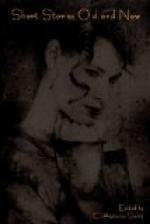The end was drawing on: the golden bowl was breaking; the silver cord was fast being loosed—that animula blandula, vagula, hospes, comesque[*] was about to flee. The body and the soul—companions for sixty years—were being sundered, and taking leave. She was walking alone, through the valley of that shadow, into which one day we must all enter,—and yet she was not alone, for we know whose rod and staff were comforting her.
[* “Little, gentle, wandering soul, guest and comrade.”—Hadrian’s “Address to his Soul”]
One night she had fallen quiet, and as we hoped, asleep; her eyes were shut. We put down the gas, and sat watching her. Suddenly she sat up in bed, and taking a bed-gown which was lying on it rolled up, she held it eagerly to her breast,—to the right side. We could see her eyes bright with a surprising tenderness and joy, bending over this bundle of clothes. She held it as a woman holds her sucking child; opening out her night-gown impatiently, and holding it close, and brooding over it, and murmuring foolish little words, as over one whom his mother comforteth, and who sucks and is satisfied. It was pitiful and strange to see her wasted dying look, keen and yet vague—her immense love.
“Preserve me!” groaned James, giving way. And then she rocked back and forward, as if to make it sleep, hushing it, and wasting on it her infinite fondness. “Wae’s me, doctor; I declare she’s thinkin’ it’s that bairn.” “What bairn?” “The only bairn we ever had; our wee Mysie, and she’s in the Kingdom, forty years and mair.” It was plainly true: the pain in the breast, telling its urgent story to a bewildered, ruined brain, was misread and mistaken; it suggested to her the uneasiness of a breast full of milk, and then the child; and so again once more they were together, and she had her ain wee Mysie in her bosom.
This was the close. She sank rapidly: the delirium left her; but, as she whispered, she was “clean silly;” it was the lightening before the final darkness. After having for some time lain still—her eyes shut, she said “James!” He came close to her, and lifting up her calm, clear, beautiful eyes, she gave him a long look, turned to me kindly but shortly, looked for Rab but could not see him, then turned to her husband again, as if she would never leave off looking, shut her eyes, and composed herself. She lay for some time breathing quick, and passed away so gently that, when we thought she was gone, James, in his old-fashioned way, held the mirror to her face. After a long pause, one small spot of dimness was breathed out; it vanished away, and never returned, leaving the blank clear darkness of the mirror without a stain. “What is our life? it is even a vapor, which appeareth for a little time, and then vanisheth away.”
Rab all this time had been full awake and motionless; he came forward beside us: Ailie’s hand, which James had held, was hanging down; it was soaked with his tears; Rab licked it all over carefully, looked at her, and returned to his place under the table.




